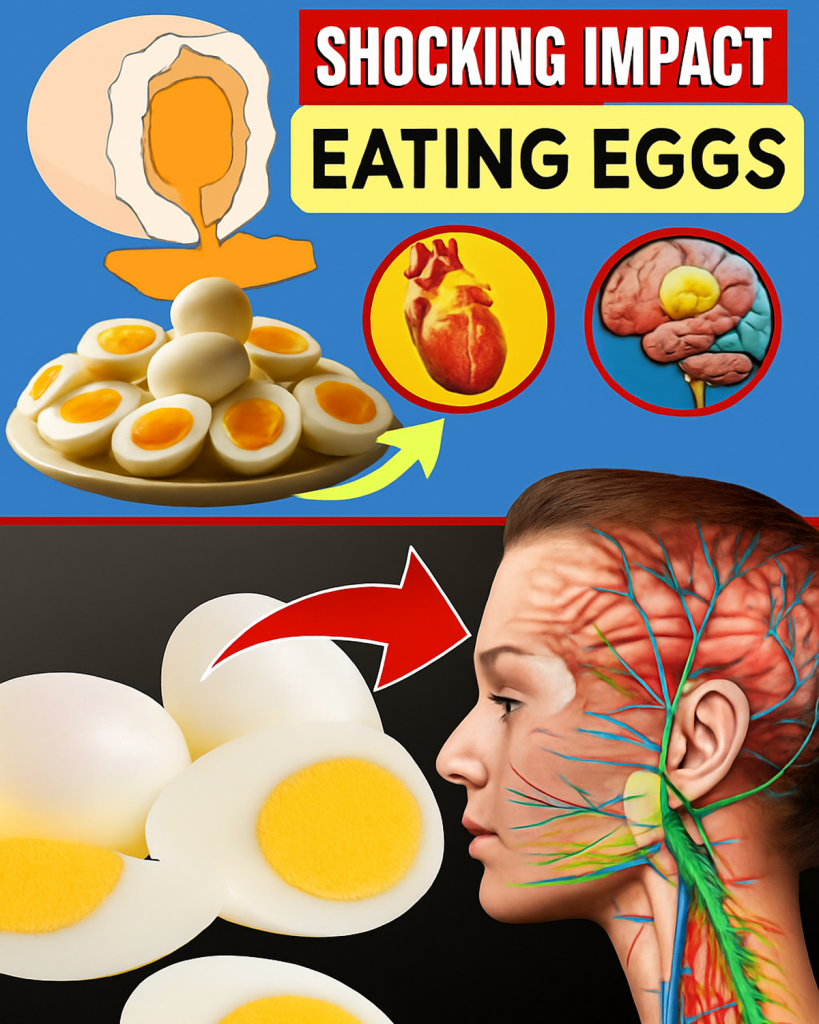Eggs are among the most affordable and widely consumed foods in the world. In fact, the average American eats about 280 eggs per year. That’s nearly one egg for every day! Despite their popularity, eggs have often been at the center of debate. Are they good or bad for your heart? Do they raise cholesterol? Should you eat them daily?
Here’s the truth: eggs are nutritional powerhouses. They’re packed with protein, vitamins, minerals, and antioxidants that can influence nearly every system in your body. If you start eating eggs every day, some surprising things begin to happen—many of which can improve your health, energy, and even your brain function.
In this article, we’ll explore what really happens to your body when you make eggs part of your daily diet. You’ll learn about their benefits for muscle growth, brain health, weight management, and more, along with practical tips on how to enjoy them the right way.

Eggs Provide High-Quality Protein
One of the biggest benefits of eggs is their protein content. Each large egg contains about 6 grams of complete protein, which means it provides all nine essential amino acids that your body cannot produce on its own.
This makes eggs particularly valuable for:
- Muscle growth and repair after exercise.
- Weight management, since protein helps you feel fuller for longer.
- Healthy aging, as protein preserves lean muscle mass.
A simple breakfast of two boiled eggs gives you nearly 12 grams of protein, enough to kick-start your metabolism and keep hunger at bay until lunch.
They Support Brain Health
Eggs are one of the best natural sources of choline, a nutrient that plays a critical role in brain function, memory, and mood regulation. Unfortunately, many people don’t get enough choline from their diets.

Daily egg consumption helps fill this gap, supporting:
- Better focus and concentration.
- Healthy brain development in children.
- Reduced risk of cognitive decline in older adults.
In fact, choline is so important that it’s sometimes referred to as “brain food.” Having an egg or two daily can make a real difference in how sharp and alert you feel.
Eggs Promote Healthy Eyes
If you eat eggs every day, your eyes may thank you. Egg yolks are rich in lutein and zeaxanthin, antioxidants that accumulate in the retina and help protect against age-related macular degeneration (AMD), one of the leading causes of vision loss.
Studies show that people who consume eggs regularly have higher levels of these protective antioxidants in their eyes. Combined with vitamin A, which is also found in eggs, they help maintain good night vision and reduce the risk of long-term eye problems.

They May Improve Heart Health
For years, eggs were criticized for their cholesterol content. A large egg contains about 186 mg of cholesterol. However, research now shows that dietary cholesterol doesn’t raise blood cholesterol in the way once believed.
In fact, eggs may improve your cholesterol profile by:
- Raising HDL (“good” cholesterol).
- Supporting a healthy balance between HDL and LDL.
Of course, the effect can vary depending on the individual. For most healthy people, eating one to two eggs daily appears safe and may even protect the heart when combined with a balanced diet.
Eggs Can Aid Weight Management
If you’re trying to lose or maintain weight, eggs can be your ally. Their high protein and nutrient density make them satisfying without being calorie-heavy. One large egg has only about 70–80 calories.
A study published in the International Journal of Obesity found that people who ate eggs for breakfast felt fuller and consumed fewer calories throughout the day compared to those who ate bagels. That’s why many weight-conscious individuals rely on eggs as a go-to morning option.
Practical tip: Combine eggs with vegetables for a nutrient-packed, low-calorie meal that keeps you energized for hours.

They Strengthen Bones and Immunity
Eggs are a natural source of vitamin D, a nutrient many people are deficient in. Vitamin D plays a vital role in:
- Bone health, by helping your body absorb calcium.
- Immune support, keeping your defenses strong.
Along with other nutrients like zinc, selenium, and vitamin B12, eggs contribute to a strong immune system and overall resilience.
Practical Ways to Add Eggs to Your Diet
The versatility of eggs is one of their greatest strengths. You can enjoy them in countless ways:
- Boiled for a quick snack.
- Scrambled with vegetables for a filling breakfast.
- Poached on whole-grain toast with avocado.
- Baked into frittatas or muffins for meal prep.
For maximum benefit, try to balance eggs with whole grains, fresh vegetables, and healthy fats.

Conclusion
Eating eggs every day can provide your body with high-quality protein, brain-boosting choline, vision-protecting antioxidants, and heart-friendly nutrients. They support weight management, bone strength, and immunity—all while being affordable and versatile.
Frequently Asked Questions
Is it safe to eat eggs every day?
For most healthy people, yes. One to two eggs per day are generally considered safe and beneficial.
Do eggs raise cholesterol?
They contain cholesterol, but research shows that moderate egg intake doesn’t significantly raise blood cholesterol for most people.
What’s the healthiest way to cook eggs?
Boiling or poaching is ideal, as it avoids excess oil and preserves nutrients.
This article is for informational purposes only and is not a substitute for professional medical advice. Always consult with a healthcare provider before making major dietary changes.




